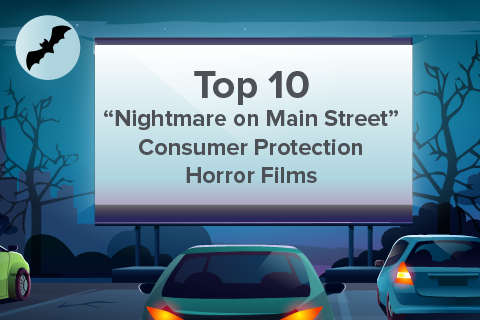Halloween is the perfect time to stream your favorite horror flick, but nothing comes close to the spine-tingling fright inflicted by businesses that fail to honor established consumer protection standards. Here is our Top 10 List of Really Scary Movies.
Creature from the Hack Lagoon. Hackers won’t wait for Halloween to unleash their barrage of tricks. The best defense for businesses is a 360° approach that minimizes the collection of sensitive information in the first place, maintains it securely while it’s in your possession, and trains your staff and contractors to honor your security standards. Not sure where to start? The FTC’s Cybersecurity for Small Business offers advice on protecting your company from some of hackers’ ghastliest tricks, including ransomware and business email imposters.

Flack-ula. Our response to companies that suck the truth out of ads by employing deceptive or unfair tactics related to reviews and endorsements: “Fangs for nothing.” That goes for the advertisers themselves and the flacks they hire to lend a hand. In addition to bringing law enforcement actions, the FTC is exploring a potential rule to combat illegal practices – for example, using fake reviews, paying for positive reviews, and suppressing negative ones.
The Blair Pitch Project. You're lost, you're angry in the woods, and no one is here to help you. The slogan for that mockumentary must be what it feels like when consumers realize they’ve been lured in by a misleading money-making pitch. But they’re not alone. The FTC continues to bring cases challenging deceptive claims and has put more than 1,100 businesses that pitch business ventures on notice that if they mislead people about potential earnings, the FTC won’t hesitate to seek civil penalties against them.
Dr. Jekyll and Mr. Hide. A new FTC Staff Report sheds light on the ways that marketers have been known to manipulate the buying process through the use of dark patterns – digital design elements that hide from consumers the actual cost or true terms of a transaction. Other dark patterns trick people into disclosing personal information. The Report reiterates the FTC’s commitment to taking action against unlawful design tactics.
Invasion of the Data Snatchers. Some companies claim they need consumers’ personal information for an innocent reason like security authentication or fulfilling an order. Then they turn around and use that information for another purpose, too. It’s a spooky practice that honest businesses should avoid.
It Came From Outer Space. If it comes from outer space, don’t falsely label it as “Made in USA.” Made in USA claims are highly material to many consumers. Marketers and manufacturers that promote their products as Made in USA must meet the long-standing “all or virtually all” standard – or must clearly and appropriately qualify their representations. What’s more, the FTC’s Made in USA Labeling Rule, in effect since August 2021, could mean hefty civil penalties for companies that make deceptive claims.
Polter-guessed. Data thieves are canny observers of human nature and know that some people pick a password and routinely reuse it. So they may steal usernames, passwords, or other credentials from fairly innocuous sources and then use them to guess their way onto financial sites, credit card accounts, or your company’s networks. Security-conscious businesses educate their staff about the dangers of recycling passwords.
The Silence of the Spams. Some businesses mistakenly assume the CAN-SPAM Rule applies just to sleazy bulk email. In fact, it covers all commercial messages, which the law defines as “any electronic mail message the primary purpose of which is the commercial advertisement or promotion of a commercial product or service.” The good news is that compliance isn’t complicated. The FTC has advice for businesses, including answers to questions you may have about the Rule.
Night of the Living Shred. Once your company no longer has a need to maintain sensitive data, it’s a mistake to hold onto it “just because.” When the legitimate business reason for keeping data has passed, savvy companies routinely get rid of digital files, paperwork, and equipment – and they use secure disposal methods designed to erase the information forever.
Phantom of the Owe-pera. Ask consumers what really strikes fear in their hearts and they may say the surprise of getting stuck with unnecessary and unavoidable fees. Whether they show up as charges the consumer didn’t agree to, optional services falsely characterized as mandatory, or added costs for products or services with little value, junk fees come crashing down on consumers like an opera house chandelier. The FTC has announced an Advance Notice of Proposed Rulemaking seeking comment on the harms caused by junk fees and the tactics companies use to impose them.
Do you have a favorite consumer protection horror film we haven’t listed? Share it in the comment section.

Love it!
Very good article